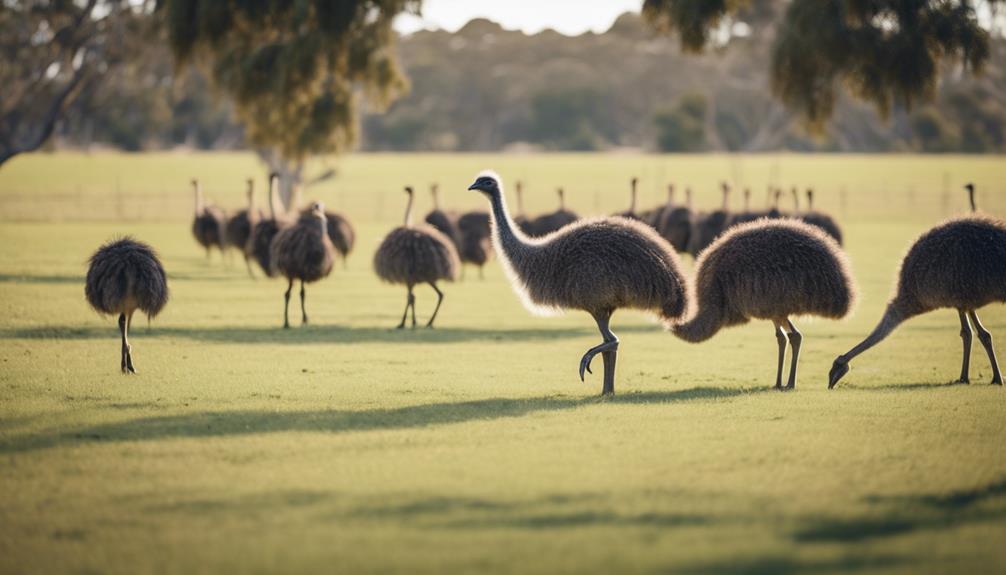
Embrace the potential of Emu Farming as a sustainable business venture.
With a focus on eco-friendly practices and a growing market demand for emu products, the industry offers promising opportunities for entrepreneurs.
Discover how emu farming aligns with current trends towards ethical consumption and explore the various avenues for profitability in this sector.
The benefits may surprise you, compelling you to explore this burgeoning field further.
Key Takeaways
- Emu farming offers economic viability and investment opportunities.
- Sustainable practices ensure long-term success and environmental benefits.
- Emu products provide health benefits and diversification prospects.
- Meeting market demands with quality products secures a thriving future in emu farming.
Benefits of Emu Farming

Emu farming offers a range of benefits for entrepreneurs looking to diversify their agricultural ventures. One of the primary advantages lies in emu breeding. These birds have a high reproductive rate, with each female capable of laying 20-50 eggs per year. This prolific breeding potential can lead to a substantial increase in your emu flock, providing more opportunities for profit through various channels such as meat production, oil extraction, and feather sales.
Moreover, the market for emu meat is steadily growing due to its low-fat content and high nutritional value. Emu meat isn't only sought after for its health benefits but also for its unique flavor profile, appealing to a niche consumer base interested in exotic meats. By capitalizing on this demand, emu farmers can secure a stable income stream while contributing to the sustainable utilization of these birds.
Sustainable Farming Practices
Implementing sustainable farming practices is crucial for ensuring long-term viability and environmental stewardship in the emu farming industry. By adopting sustainable practices and prioritizing animal welfare, emu farmers can't only meet consumer demands but also contribute to a healthier ecosystem. Sustainable practices in emu farming involve efficient water management, land stewardship, and ethical treatment of the emus. These practices not only benefit the environment but also improve the quality of emu products.
Market trends indicate a growing preference for sustainably produced goods, with consumers showing increased interest in the welfare of animals raised for food. Embracing sustainable farming practices aligns with these consumer behaviors, giving emu farmers a competitive edge in the market. By focusing on sustainability, emu farmers can build trust with consumers, enhance brand reputation, and secure long-term success in the industry. Emu farming, when done sustainably, not only benefits the farmers but also the environment and the consumers who seek ethically produced products.
Emu Products and Market Demand

To meet the increasing demand for sustainable emu products, understanding market trends and consumer preferences is essential for emu farmers. Emu products like emu leather and emu oil have gained popularity due to their unique properties and eco-friendly nature. Emu leather is known for its durability, softness, and hypoallergenic qualities, making it a sought-after material for luxury goods. On the other hand, emu oil products are valued for their anti-inflammatory, moisturizing, and healing properties, appealing to health-conscious consumers looking for natural alternatives.
| Emu Product | Key Features | Market Demand |
|---|---|---|
| Emu Leather | Durable, soft, hypoallergenic | High |
| Emu Oil Products | Anti-inflammatory, moisturizing | Growing |
As consumer awareness about sustainability and ethical practices continues to rise, the demand for emu products is expected to increase further. Emu farmers who can cater to this demand by producing high-quality emu products are likely to thrive in this evolving market.
Economic Viability of Emu Farming
Considering the current market trends and economic factors, assessing the financial viability of emu farming operations is crucial for potential investors and existing farmers alike. Profit margins in emu farming can be attractive, with various revenue streams such as emu meat, oil, leather, and feathers. Market trends show a growing demand for organic and sustainable products, positioning emu products favorably in the market.
To ensure economic viability, it's essential to conduct thorough market research to understand consumer preferences and pricing dynamics. Moreover, optimizing operational efficiency and controlling production costs are key factors in maximizing profitability. By strategically aligning production levels with market demand, emu farmers can enhance their profit margins and sustain long-term success.
Monitoring market trends regularly and adapting business strategies accordingly will enable emu farmers to navigate economic fluctuations and secure a stable financial future in the industry.
Environmental Impact of Emu Farming

As you explore the environmental impact of emu farming, it becomes imperative to understand the ecological footprint of this agricultural practice and its implications on local ecosystems. Emu farming offers several environmental benefits, contributing to sustainability through efficient land use and lower water consumption compared to traditional livestock farming. Additionally, emus produce lean meat and valuable oil while emitting less methane, reducing their carbon footprint. Conservation efforts within emu farming focus on preserving natural habitats for wild emus and promoting biodiversity through sustainable farming practices.
Environmental Impact of Emu Farming
| Environmental Impact | Description |
|---|---|
| Land Use Efficiency | Emus require less land for grazing compared to traditional livestock, reducing deforestation. |
| Water Conservation | Emus have lower water requirements than other livestock, promoting water conservation. |
| Lower Methane Emissions | Emus produce less methane, contributing to lower greenhouse gas emissions. |
| Biodiversity Preservation | Conservation efforts within emu farming aim to preserve natural habitats and promote biodiversity. |
| Sustainable Practices | Emu farming implements sustainable practices to minimize environmental impact and ensure long-term viability. |
Emu Farming Regulations and Compliance
How do emu farming regulations ensure compliance with environmental standards and ethical practices? Regulatory compliance in the emu farming industry is crucial to uphold industry standards and ensure sustainable practices. These regulations cover various aspects of emu farming, including land use, waste management, animal welfare, and product processing. By adhering to these regulations, emu farmers can mitigate environmental impact, maintain animal welfare, and produce high-quality emu products.
Industry standards play a vital role in guiding emu farming practices towards sustainability. These standards encompass guidelines for land preservation, water usage, feed quality, and humane treatment of emus. Emu farmers are required to follow these standards to operate ethically and sustainably within the industry.
Emu Farming Business Plan

Emu farming's success hinges on a well-developed business plan that integrates financial projections, operational strategies, and marketing tactics to ensure profitability and sustainability in the industry.
- Emu Breeding Techniques: Understanding and implementing effective breeding techniques are crucial for maintaining a healthy and productive emu flock. This includes proper selection of breeding pairs, monitoring breeding cycles, and ensuring optimal living conditions for the emus.
- Emu Meat Market: Researching and understanding the dynamics of the emu meat market is essential for positioning your farm competitively. Analyze market trends, consumer preferences, and pricing strategies to maximize profitability from emu meat sales.
- Operational Efficiency: Developing streamlined operational processes, such as feed management, healthcare protocols, and waste disposal strategies, can significantly impact the overall efficiency and success of your emu farming business. Implementing sustainable practices can also enhance your farm's reputation and appeal to environmentally-conscious consumers.
Health and Nutrition Benefits of Emu Products
Understanding the health and nutrition benefits of emu products is essential for making informed decisions about incorporating them into your diet or business strategy. Emu meat is low in fat and high in protein, making it a healthy option for those looking to boost their dietary intake. It's also rich in iron, vitamin B12, and omega-3 fatty acids, which are crucial for overall health and well-being. Emu oil, extracted from the bird's fat, is known for its anti-inflammatory properties and is used in various skincare products. The oil is also believed to aid in wound healing and reduce muscle and joint pain when applied topically.
In terms of culinary uses, emu meat is versatile and can be used in various dishes such as stir-fries, burgers, and salads. Its mild flavor and lean texture make it a great substitute for beef or chicken in recipes. Emu eggs are another nutritious option, with one egg containing more protein than a chicken egg. Incorporating emu products into your diet can offer a range of health benefits while adding a unique flavor to your meals.
Emu Farming Investment Considerations

Considering the financial landscape and market trends is crucial when evaluating the potential of investing in emu farming. Before diving into this venture, it's essential to weigh the investment risks and conduct a thorough market analysis to make informed decisions.
Investment Considerations:
- Market Analysis: Research the demand for emu products, current market prices, and potential competitors. Understanding the market dynamics will help you position your emu farming business effectively.
- Financial Planning: Develop a detailed budget that includes initial setup costs, ongoing expenses, and revenue projections. Consider factors like feed costs, veterinary care, and marketing expenses.
- Risk Assessment: Evaluate the risks associated with emu farming, such as disease outbreaks, fluctuating market prices, and regulatory changes. Developing risk mitigation strategies can help safeguard your investment.
Challenges in Emu Farming Industry
Facing various obstacles, the emu farming industry requires a strategic approach to navigate through its challenges successfully. Breeding challenges pose a significant hurdle, as emus are sensitive creatures with specific environmental and dietary needs. Ensuring successful breeding requires expertise and careful monitoring to maintain the health and productivity of the flock.
Market fluctuations also present a challenge in the emu farming industry. The demand for emu products can vary, affecting pricing and profitability. Adapting to these fluctuations requires flexibility and the ability to explore diverse market opportunities. Emu farmers must stay informed about market trends and consumer preferences to make informed decisions about their production and pricing strategies.
To overcome these challenges, emu farmers can focus on continuous education, networking with other industry professionals, and staying up-to-date with the latest research and developments in emu farming practices. By being proactive and adaptable, emu farmers can navigate through breeding challenges and market fluctuations more effectively, ensuring the sustainability of their business in the long run.
Marketing Strategies for Emu Products

Navigating the challenges of breeding and market fluctuations in the emu farming industry requires strategic marketing strategies to effectively promote and sell emu products. To succeed in marketing your emu products, consider the following:
- Digital Marketing: Utilize social media platforms, email campaigns, and a well-designed website to reach a broader audience. Engage with customers online through informative content and visually appealing images to showcase your products effectively.
- Brand Positioning: Clearly define what sets your emu products apart from others in the market. Highlight the unique selling points of your products, whether it's their organic nature, health benefits, or sustainable farming practices. Establish a strong brand identity that resonates with your target market.
- Customer Engagement: Build relationships with your customers by seeking feedback, addressing their concerns promptly, and offering special promotions or loyalty programs. Encourage customer reviews and testimonials to build trust and credibility in your brand.
Future Outlook for Emu Farming
Looking ahead, the future of emu farming shows promising growth opportunities driven by increasing demand for sustainable and exotic meat products. Emu farming is poised to capitalize on current industry trends favoring environmentally friendly and healthy meat options. As consumer preferences shift towards sustainable food choices, emu meat stands out as a lean, nutritious, and ethically produced alternative. This shift is creating a favorable market landscape for emu farmers, offering significant potential for expansion and profitability.
Future Outlook for Emu Farming
| Key Aspect | Potential Impact | Action Needed |
|---|---|---|
| Diversification of Products | Capture new market segments | Research new product lines |
| Technological Advancements | Increase efficiency and productivity | Invest in technology upgrades |
| Global Market Expansion | Access new international markets | Develop export strategies |
To stay ahead in the emu farming industry, keeping abreast of emerging research opportunities is crucial. Research in areas such as breeding techniques, nutrition, and product development can provide a competitive edge and drive innovation in the sector. By aligning with industry trends and seizing research opportunities, you can position your emu farming business for sustained success in the dynamic market landscape.
Frequently Asked Questions
How Do Emus Contribute to the Ecosystem and Biodiversity on a Farm?
Emus enhance the ecosystem by aiding in seed dispersal, reducing vegetation density, and creating diverse habitats. Their presence boosts biodiversity, supporting the balance of various species. Emus play a crucial role in maintaining the farm's ecological harmony.
What Are Some Lesser-Known Uses for Emu Oil in the Beauty and Skincare Industry?
You might be surprised by the versatility of emu oil in the beauty world. Emu oil benefits your skin with its anti-inflammatory and moisturizing properties, making it a rising star in modern skincare trends.
Can Emus Be Raised Alongside Other Livestock on a Farm, or Do They Require Separate Housing and Care?
When considering livestock integration, it's important to note that emus typically require separate housing and care due to their specific needs. Providing specialized attention to emus ensures their well-being and allows for optimal growth and development.
Are There Any Cultural or Historical Traditions Involving Emus That Impact the Market Demand for Their Products?
When considering market demand for emu products, it's essential to explore consumer preferences shaped by cultural traditions. Historical impact of emus in certain cultures can significantly influence market dynamics, highlighting the importance of understanding these factors.
How Do Climate and Weather Conditions Affect the Success of an Emu Farming Operation?
In running an emu farm, the success of your operation hinges on how well you adapt to varying weather conditions. From feeding habits to breeding patterns, understanding climate impacts is crucial for health risk mitigation and disease prevention.
Conclusion
In conclusion, emu farming presents a lucrative opportunity for sustainable business growth. With its diverse range of products and high market demand, investing in emu farming can yield significant economic returns.
Like a well-tended garden, nurturing an emu farm with sustainable practices can lead to a fruitful harvest of profits. Embrace the potential of emu farming, and watch your business flourish in a market ripe for growth.




